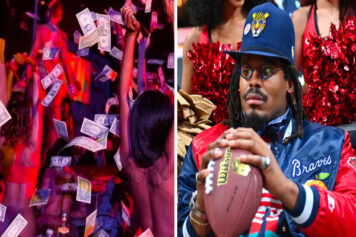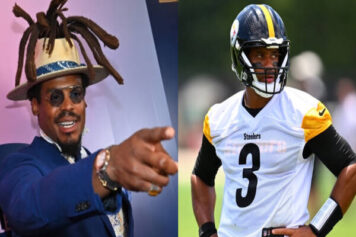The black quarterback has traversed a difficult path through murky NFL waters over the past half-century. There was a time not too long ago when NFL cognoscenti doubted the ability of black quarterbacks to handle the complexities of being the CEO of their pro offenses.
Forty-four years before Russell Wilson shattered Peyton Manning’s rookie passing touchdown record like Tim Tebow playing pitch and catch in a china shop, Marlin Briscoe broke the Denver Broncos rookie passing record. For his efforts, the Broncos cut him and he ended up as a receiver on the undefeated '72 Dolphins.
As a result, pioneers like Warren Moon, the latter day saint of modern drop back passers, took a detour through the CFL when NFL GMs asked him to play tight end. After setting the CFL record book on fire, Moon returned with guns blazing at the helm of the Houston Oilers’ run-and-shoot offense.
Shockingly, he’s still the NFL’s only black quarterback in Canton, but contemporary black signal callers don’t have that problem. Especially after Cam Newton and Robert Griffin III dashed their way to the top of the NFL Draft. After he finishes up his junior season, 20-year-old Louisville quarterback Teddy Bridgewater is expected be the first quarterback off the board in April’s draft.
Previous generations of black quarterbacks were defined by what they couldn’t do. Today they’re bunched together based on what is assumed they can do—run the football.
These stereotypes don’t hold the same mean-spirited racial undertones as the crowd that once questioned previous waves of black quarterbacks’ cognitive abilities. However, Pavlov’s bell rings at a certain frequency whenever a black quarterback steps onto the field. It’s why absurd notions of Geon Smith running the read-option are still bandied about in New York.
There’s a conditioned thinking behind the notion that every black quarterback has the propensity to sprint for a first down when pressure flushes the pocket. Even major recruiting services fall for the hustle.
According to Rivals.com’s expert preps rankings, Bridgewater was an elite dual-threat prospect in class of 2011. Conversely, Andrew Luck was recognized as a pure drop back passer three years earlier. However, the numbers tell a surprisingly different tale. Bridgewater rushed for 86 yards as a sophomore.
Luck, who may be too mobile for Chuck Pagano’s liking, rushed for over 2,000 yards during the course of his high school career and could have been an ideal fit for Oregon’s zone read-option attack. Bridgewater gained 223 yards on the ground as a senior, but Luck was Rivals’ fourth-ranked pro-style passer. Naturally, Bridgewater was filed into the same category as Johnny Manziel, Marcus Mariota and Brett Hundley. That grouping resembles a 100-meter relay team comprised of three sprinters and a Jamaican bobsledder.
In a recent Time Magazine interview, Colin Kaepernick spoke about the double-edged sword of being double trouble behind center.
"To me, when people say, 'Oh, you're a freak athlete'" — he pauses — "it's bittersweet. It's a huge compliment to say, O.K., you have physical abilities that are kind of above and beyond. But at the same time, I feel like it diminishes the mental side of the game. And I think it takes away from the time we study the playbook, the time we spend in the film room and the preparation we put in."
Does race explain why dual-threat quarterbacks like himself, Robert Griffin III of Washington, and Russell Wilson of Seattle — all black — are more likely to be labeled "freaks" than, say, Andrew Luck of the Indianapolis Colts? "It’s a touchy subject, 'cause I never want to take it there, where it seems like it's all about race," says Kaepernick. "But I feel like that's something that comes along with the territory of being a black quarter-back. When you have success — 'Oh, you're a freak athlete.' Not, 'Oh, you're a good quarterback.' And I think that's a barrier that needs to be broken down."
Basically, a black quarterback who doesn’t run might get the side eye like country stars twerking at the VMAs. Bridgewater doesn’t possess similar world-class speed and quickness as RGIII or Newton’s stew of size and agility, but he may be the sledgehammer wielding quarterback Kaepernick was referring to. He’s merely a mortal operating amidst a swarm of freakish athletes invading the position and is the most heralded non-scrambling black quarterback prospect to ever come whizzing down the NCAA pipeline.
“I feel that every quarterback can be labeled as a running quarterback,” Bridgewater acknowledged to The Courier-Journal. “That’s just another club that they have in their golf bag. That’s a tool that you have as a quarterback to be able to escape and keep plays alive. But I just feel that I’m more of a passer first. … I don’t want to be part of an offense where I have to take hits.”
Zone-read option offenses are gridiron Botox for college quarterbacks, hiding deficiencies from NFL scouts as well as zone defenses hide shoddy defenders on the hardwood. Louisville’s offense is a multi-set, pro-style and spread system, but Bridgewater gives it a potent kick.
Next April, he may be the most mundane black quarterback to ever go in the top two picks. Scouts will examine for holes, but upon close inspection, Bridgewater’s skillset is bulletproof. Bridgewater may not be the No. 1 prospect because of Jadeveon Clowney, but his intangible impact on the reputation of black quarterbacks could be equally consequential.
"Pro-ready" and "franchise quarterback" are two independent attributes. Bridgewater is both. He’s already led the Louisville program back from Steve Kragthorpe’s disastrous regime. Louisville has combed through Miami’s prep schools for talent in the Charlie Strong era, making Bridgewater, the former Miami Northwestern quarterback, the face of their new South Florida import recruiting philosophy.
Bridgewater wasn’t even the top prep quarterback to matriculate through Miami Northwestern’s juggernaut prep football program in the past half-decade. G.U.M.P (Great Under Major Pressure), as he’s known by teammates, assumed the quarterback reins from Jacory Harris, who won a pair of mythical national championships in the starting role and flourished.
Bridgewater initially intended to follow Harris’ footsteps by committing to Miami before re-opening his recruitment following Randy Shannon’s dismissal. After LSU put him on the backburner while they pursued UGA transfer Zach Mettenberger, Bridgewater was compelled to hop aboard a rebuilding Louisville program by Charlie Strong and former Miami recruiting coordinator Clint Hurtt.
However, as his junior season kicks off, he’s about to enter foreign territory as an athlete. For years he’s snuck under the radar. In a few days the Teddy Bridgewater Tour begins its 14-week national tour.
It’s become an annual preseason exercise to anoint the NFL’s next “chosen one” under center. Unlike RGIII and Newton, the preseason hype revolves around Bridgewater. Johnny Manziel’s offseason antics have made him college football’s grandest sideshow, but he’s not the main attraction for pro scouts. Louisville’s junior signal caller fades into the crowd at first glance, but has the acumen to run any offense, moves well, possesses fantastic anticipation skills and can thread the needle.
NFL talent evaluators are assassins. These faceless talent arbiters can slay draft stocks for even the most highly-touted draft prospects. Ask Brian Brohm. Six years after the 2009 NFL Draft, Louisville’s passing record hoarder is still bearing the scars of his plummet from projected No. 1 overall pick to second round selection when he returned for his senior season. After the 2012 season, debating the merits of junior Matt Barkley vs. RGIII didn’t win you a straightjacket and an involuntary stay in a padded room.
Scouts will hone in on Bridgewater’s accuracy throwing left, but that’s the nature of the game. Besides, Bridgewater is a manic perfectionist.
“When we were in quarterback school during the winter break, we broke down pretty much every play from last year, and it came up a lot that I wasn’t accurate throwing to my left,” he disclosed to The Courier-Journal. “I was pretty much kicking my heel at 45 degrees instead of keeping your shoulders straight and opening your hips (to keep) everything in balance into the throw.”
The archaic questions about leadership qualities of black quarterbacks isn’t a concern either. You won’t hear much bluster rolling off Bridgewater’s tongue. He’s a taciturn 20-year-old field general who has beefed up his locker room role and earned the respect of teammates.
“Now he’s a leader, and the guys really respect him. … Everything about him is how he goes about his work.” Strong told The Courier-Journal. A lot of times (with) people, you hear their voice before you see them. You don’t have to deal with that with Teddy. He doesn’t say much. He just goes about his work.”
For the first time, national eyes are focused squarely on him as the season kicks off. The expectations for Bridgewater’s final season of NFL auditions are tremendous. Anything short of an undefeated regular season and a repeat of his 3,700 yard, 27 touchdown, eight interception sophomore season is going to be considered a letdown. From defensive coordinators to scouts and casual fans, the target is trained squarely on his chest.
Prior to bowl season, there were concerns that the aggrandizing of Bridgewater was the byproduct of a soft schedule. His brilliant All-State Sugar Bowl alleviated those concerns slightly. Florida’s defenders were waking up in a tub of ice with a missing kidneys by the time Bridgewater was finished carving up Will Muschamp’s secondary. His arrival on the big stage was a far cry from his debut as Louisville quarterback when his first pass as a true freshman resulted in an interception. Since then, Louisville and collegiate defenses have learned to never doubt Bridgewater. This fall, the rest of the nation will get force fed the same lesson.



